November 27, 2025 | 11:59 GMT +7
November 27, 2025 | 11:59 GMT +7
Hotline: 0913.378.918
November 27, 2025 | 11:59 GMT +7
Hotline: 0913.378.918
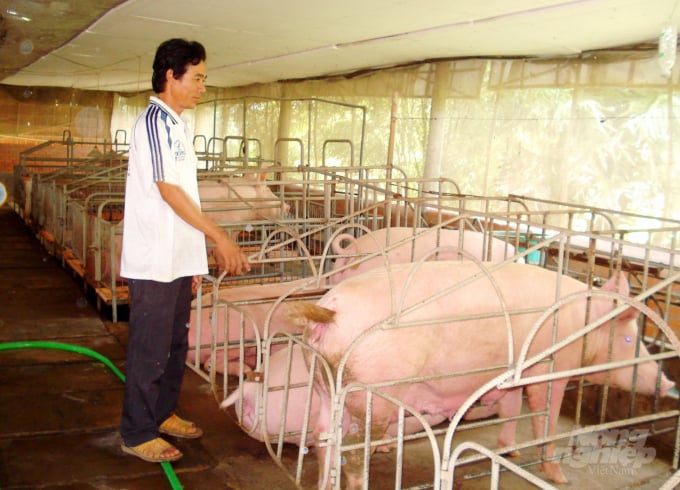
With the current selling price, pig farmers lose at least VND 1.4-1.5 million per head. Photo: Le Hoang Vu.
On October 19, the price of a live pig in Mekong Delta provinces ranged between VND 37,000 and 38,000 and continued to decline by VND 1,500-3,000 per kilogram on an interweekly basis. Previously, the price of pig was between VND 82,000 and 85,000 per kilogram in early 2021.
According to certain pig home farms, the costs of various kinds of industrial animal feeds rose by 30% year over year, while the cost of raising pigs also increased, contributing to the rise in production expenditures.
The cost of rearing a 100kg pig on a small-scale home farm is between VND 5.5-6 million. Pig farmers lose VND 1.5-2 million per quintal at the present selling price.
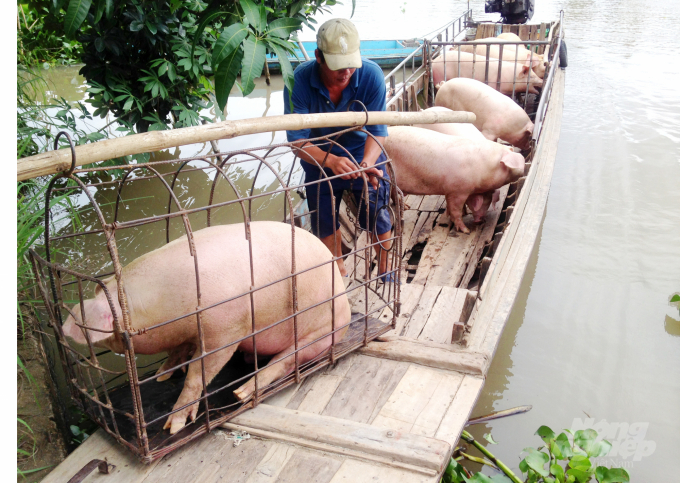
Traders buy pigs from households in the Mekong Delta. Photo: Le Hoang Vu.
Tien Giang province, with approximately 350,000 pig heads, is one of the Mekong Delta's biggest pig farming hubs. At the moment, the price of commercial live pigs has plummeted, putting many farmers in financial difficulty.
Mr. Nguyen Tan Binh's family in Thoi Son commune, My Tho city, has been thrust into a precarious position due to the unsellability of his pig farm with more than 120 pigs.
"At the moment, many markets have not started, and trade is modest. Breeders advocate for local governments to reopen local markets, enable employees to return to work, and students to return to school in order to expand possibilities for pig trade "Mr. Nguyen Tan Binh said.
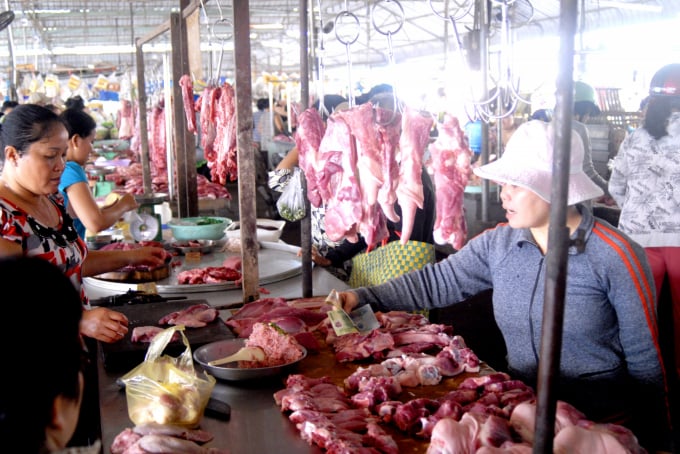
As the price of pigs is declining, many pig farmers in the Mekong Delta proposed to slaughter animals themselves and sell the meat in retail stores; nevertheless, the price will be higher than the price of live pigs. Photo: Le Hoang Vu.
Recently, African swine disease was eliminated in Can Tho, allowing people to re-herd pigs. At the moment, there are many herds of pigs for sale, resulting in an ample supply of live pigs and meat.
Additionally, as a result of the Covid-19 outbreak, consumption has become difficult, and many small companies have restricted their purchases of live pigs.
Since then, the number of live pigs has increased, farmers have had to spend more money on animal feeds, and losses have increased even more. Numerous pig farming households provide the option of self-slaughtering pigs for sale in retail marketplaces at rates ranging from VND 60,000 to 70,000 per kilogram.
Ben Tre province is one of the Mekong Delta's biggest producers of commercial pigs. Mr. Tran Quang Thai, Director of the Ben Tre Sub-Department of Livestock Production and Animal Health, stated: "At the moment, the province's pig herd is projected to number 410,000 heads.
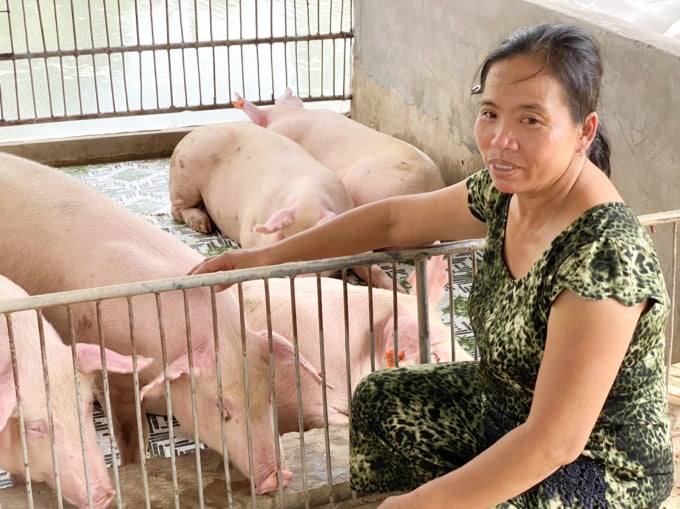
Facing the situation of pork prices falling sharply, the provinces in the Mekong Delta have not innitiated any policies to support farmers. Photo: Le Hoang Vu.
Due to low pig prices, farmers are experiencing difficulties. Numerous individuals are slaughtering pigs for sale in order to recoup money without going via merchants. At the moment, households are attempting to fight the situation and avoid being re-herded. Currently, the province lacks a policy aimed at assisting farmers. Additionally, I hope the government has measures in place to aid livestock recovery and boost domestic live hog prices."
According to Mr. Nguyen Van Dung, a farmer with the An Phuoc Biosafety Breeding Cooperative Group (Ben Tre province), the unit now has 18 farmers engaged in biosafety pig production. At the moment, farmers sell pigs for between VND 3.2 and 3.4 million per quintal, far below the cost of production. There are families who have lost at least VND 20 million, while those that grow a large number of pigs have lost hundreds of millions. Because the price of pigs is too low to sell, many individuals are forced to kill and sell in order to recoup their investment, but the more they raise, the greater their losses.
Mr. Tran Tien Hiep, Head of the An Giang Livestock Production and Animal Health Sub-Department, said that An Giang's pig population is now steady at over 58,000 heads. The task of maintaining safety and avoiding pig epidemics is still being carried out on a regular basis by the area. However, as a result of the Covid-19 pandemic's effect, consumption capacity fell, resulting in a fall in the price of pigs, posing problems for farmers. Additionally, the agriculture industry has taken many steps to assist farmers, including establishing connections and contacting merchants.
To address the issue, responsible authorities organize farmers to adopt risk-minimization measures in livestock, such as using appropriate breeding methods to prevent infections entering the farm, reducing breeding expenses, and establishing a chain of livestock production. Restructuring the livestock sector by identifying and directing the establishment of sustainable pig herds.
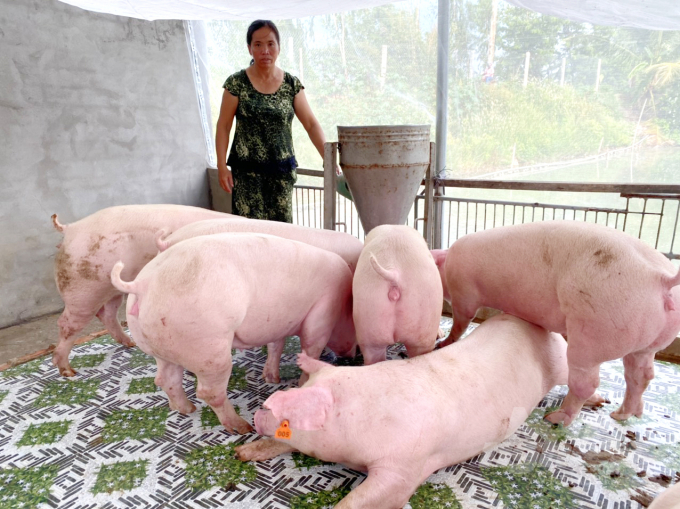
Farmers are expecting that in the last months of the year, the price of pigs will back to the upward trend, creating more profit for farmerst. Photo: Le Hoang Vu.
Additionally, the agriculture sector improves inter-sectoral cooperation at the border gate to conduct thorough inspections of transport vehicles and hand-carried items to prevent pigs and pig products from being smuggled. Simultaneously, educate and organize livestock families to actively protect their pigs from illness.
Mr. Doan Van Danh, Director of the Ben Tre province's Department of Agriculture and Rural Development, said that people's ability to expand their herds is restricted at the moment. Connecting is essential to boost local consumption and minimize frozen meat imports.
Additionally, promoting circulation throughout the Covid-19 era. Mr. Doan Van Danh also proposed that the Central Government establish a facility to buy, freeze, and process food during times of low costs and to maintain a balance during times of high prices.
Translated by Linh Linh

(VAN) China’s cooking oil is suddenly flooding into India. It all comes down to a soybean surplus that Beijing doesn’t quite know what to do with.

(VAN) An Giang promotes supply-demand connections, standardizes quality and builds value chains, creating a foundation for sustainable bird’s nest development and aiming to expand exports.
/2025/11/24/5339-4-nongnghiep-075331.jpg)
(VAN) Recently, the conference on 'Sustainable Fisheries Linkage Chain - Tilapia for Export' took place in Tien Hai commune, Hung Yen province.
/2025/11/21/4309-2-153400_128.jpg)
(VAN) Green and low-emission rice is paving the way for Vietnamese rice to enter high-end markets, marking the beginning of a transformation journey toward greening and elevating the national rice brand.

(VAN) ‘Right to Win’ outlines a national action plan that shapes a new vision for Viet Nam’s agriculture in an era of renewal and global integration.

(VAN) Lam Dong’s farmed sturgeon output this year is expected to reach 2,300 tons, worth VND 450 billion, affirming the brand’s position on the market.

(VAN) A surge in Ukrainian egg exports, largely driven by soaring sales to the UK over the last few years, has notably pushed up egg prices on the domestic market.